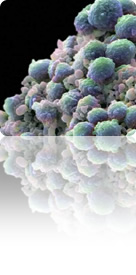

Prostate cancer is the most common male malignancy but its progression rate is only 30%. In autopsy series, it has been shown that it may be present in a greater percentage than usually estimated, from the 4th decade. More refined detection methods are increasing the number of patients undergoing radical surgical treatment for tumors that perhaps would not progress.
Due to the difficulties in obtaining samples for high throughput molecular analysis from early tumors, genes that could be decisive for the transition from a latent phase to an aggressive one leading to progression, are still unknown. Therefore, there are no clues to select patients for a less radical treatment. If genes distinguishing these groups were identified, a better knowledge of the natural history of prostate cancer could be gained, and it could be applied to better identifying patient risk and to designing more precise therapeutic strategies.
To identify genetic signatures that could be involved in the transition from a hypothetical latent to a clinically significant phase, to better understand the natural history of prostatic carcinoma and to design adequate treatment strategies for each patient.
Coordinator:
Josep Lloreta(ELIMINAR)
Tel:
93 248 30 32
Pg Marítim, 25-29
08003 Barcelona
© Institut Hospital del Mar
d'Investigacions MèdiquesLegal Notice and Privacy Policy | Cookie Policy | Site Index | Accessibility | Find Us | Contact